- Home
- Charles L. Grant
The Tea Party - A Novel of Horror Page 2
The Tea Party - A Novel of Horror Read online
Page 2
Sound was muffled as the air pressure altered and his ears were stoppered.
Deafened, partially blinded, he was prepared to wait it out until he realized that in a very short time the banshee gale was going to pump the air from his lungs, that the cold was going to freeze him—that in the middle of July he was going to be battered to death or die of the cold.
And as he opened his mouth to shout . . . it ended.
As abruptly as it had begun, it was over, and he toppled onto his side, no longer braced against the wind.
“God . . . damn!”
He lay for several long seconds gulping for a breath before he moved his arms down, slowly, to avoid cramping. His chest ached, and his legs stung and throbbed in a hundred different places. The taste of blood mingled with dirt made him spit several times. Then he lifted his head and pushed himself up until he could sit with his forearms draped over his knees. The backs of his hands were an angry red, and a thin line of blood trickled down over one knuckle. A palm ran gently over his sides to test for broken ribs. He blinked once and hard, and shook his head vigorously before realizing that the heat had returned and sweat was already breaking out under his arms. The yard had been scoured clear, and dead branches were piled in a huddle on the garage’s far side.
Maggie was beneath her oak, grazing.
The trees were still.
“Jesus,” he whispered, and struggled awkwardly to his feet, dusted himself off, and stared at the sky. There were no storm clouds that he could see, no thunder he could hear; only the sun heading west and the humidity’s clinging haze.
“Jesus, what the hell was that?”
Maggie raised her head, shook her mane, snapped her tail at a fly.
When he felt he could take a step without falling, he walked clumsily to the fence and leaned heavily against it, watching the calm buckskin shift from spot to spot in search of the perfect meal. There was no indication she was still disturbed, and when he called to her, she only lifted her head, shook it, and snapped at a green leaf spiraling out a tree.
He grunted, more than willing to believe it had all been a hallucination brought about by the week-long heat wave; more than willing, and virtually praying, until he saw the divots Maggie had tossed aside in her inexplicable rage, and felt the dull pain in his thighs and side where the rocks and branches had struck him.
The only plausible explanation was the arrival of a new frontal system; here in the eastern foothills of the Appalachians it wasn’t unusual for abrupt, powerful winds to sweep through minutes ahead of a changing weather pattern. And though they were often preceded by impressive cloud formations, neither was it odd for a front to barrel through out of a perfectly clear sky.
He checked the mare again and decided that that answer was just as good as any. Just as good, and it would have to do.
A brisk shake of his shoulders as he recalled the knifing cold, and he exhaled as loudly as he could in forced relief. The aching subsided. The stinging on his hands faded until he could ignore it. He strode to the back door, opened it, and stepped inside without turning.
Just as good, but he didn’t like it.
* * *
The kitchen was the smallest room in the house, with just enough space for a table by the back window, and the appliances, counters, and cupboards, none of which were more than six years old. To the immediate right a doorway opened onto a cluttered study/office lined with bookshelves, and he glanced in without entering, wincing guiltily at the drafting table by the window.
He supposed he ought to get to work. The ostensible purpose of the ride had been to sweep his head clear of conflicting ideas, to settle on the design so he could take care of it the instant he walked back through the door. The trip, however, had taken longer than he’d planned, and the incident with the wind made him a little jumpy. No sense trying anything now. He’d have to calm himself a bit more, no question about it; and no, he answered a small nagging at the back of his head, I’m not procrastinating.
A quick grin; he was a liar.
The water ran disturbingly cold when he turned on the faucet, and he waited a second before he rinsed out his mouth, spitting, grimacing at the blood that swirled down the drain. A tentative prod found a loose tooth on the right side; another rinse, and the bleeding stopped. Then he washed his hands without soap, and dried them on a succession of plain paper towels. After taking a can of beer from the refrigerator, he walked stiffly down an unlighted hallway to the large front room that swung away to his right, twenty feet square, a cathedral ceiling, and a gallery off of which opened four doors.
The walls were paneled in white pine, the fireplace on the west wall was made of fitted stone; the floor was pegged and bare, except for a worn throw in front of each of two armchairs and a long, three-cushioned sofa that faced the raised slate hearth. A walnut stereo cabinet stood in the far corner, its four speakers wall-mounted below the gallery’s level. Old newspapers and magazines lay in a tilting pile beside the fireplace, and here too a number of shelves nearly filled with books.
Shades of brown, shadows of gold, a spot here and there of deep red and dark green. Even the draperies over the wide front window were splotched with the hues of the woodland outside.
It seemed spare, not for frequent company, and apparent even to him that he was the only one in the house.
A long drink, a longer sigh, and he walked over to the stereo. It was time, he thought, for a little culture, an uplifting of the spirit.
A jumble of cassettes lay beside a dusty tape deck, and he plucked one up without looking at the label, fitted it, and stepped back to the center of the room. The speakers hissed. He set the beer can on the floor and raised his hands just in time to begin conducting the opening theme of Lux Radio Theater, then glowered theatrically as the medley deepened into the pounding of The FBI in Peace and War, grinned at Fibber McGee and Molly. By the time he had guided the Lone Ranger through the William Tell Overture, he was laughing.
“Ah, Douglas,” he said as he turned off the tape and retrieved his beer, “you were born too late. You could’ve been a star, the greatest maestro of the airwaves.”
If he didn’t feel entirely at ease then, he felt considerably better than when he’d walked in. The cassettes were hastily shoved into a stack that tipped over the moment he turned away, and he stood there a second before deciding that his passion for old radio shows was not to be sated this afternoon. This wasn’t the time to listen to a gravel-throated Rochester try to mollify Jack Benny.
He pulled the drawstring to open the draperies, turned a leather chair around, and sat down to watch the world.
There was no sign of the windstorm.
He wondered if he ought to call Judy or Liz and tell them about it, changed his mind because no doubt it had done the same to the town. Besides, Judy would be opening the tavern about now, and Liz would be at her county seat office, juggling court cases and muttering about the way some judges still looked at women lawyers. She didn’t need to waste a minute while he told her he was frightened.
“You’re a coward,” he told himself then, knowing full well she’d be glad to hear his voice. “And you’re not frightened, you’re just plain dumb.”
Or unsettled. Anyone would be, even Captain Marvel.
Ten minutes later, the beer forgotten and warming in his hand, he started when he thought he saw someone staring in at him through the window.
i didn’t murder him
he’s still dead
i did not murder him
but he’s still dead, you killed him
He almost bolted, then sagged back again when the face receded into the sunlight that had him squinting.
he’s dead
His reflection, nothing more—a man’s round face tanned and pleasantly lined, thick auburn hair beginning to show traces of grey at the temples; a small mouth, small nose, eyes in contrast just a shadow too large.
He touched a steady finger to his chin; the reflection did the same. Simon says
do this, he thought, and put the beer can on the floor.
you killed him
“Shit,” he muttered, and without warning he was once again a wide-eyed twenty-four, living in Seattle. He had just completed a major project, not his first by any means, and had come racing home from the office, the wunderkind architect, hired right out of college. He’d rushed to the eighth-floor apartment he shared with his fiancée Ellen, two hours before he was due.
He called out cheerfully when he entered, stopped and dropped his briefcase when he heard muffled noises in the bedroom. Another call, no response, and he hurried, heart abruptly leaden. She was there, but she was not waiting; she was in their king-sized bed with a man he didn’t know. He was immobile, she was hysterical, and the man leapt from the bed, not bothering to fetch his clothes, evidently deciding that taking the offensive would drive Doug away. But Doug felt a rush of heat that blinded him, deafened him, and a single step forward had him in a fight.
It was a graceless battle, more wrestling than punching, staggering around the room, bouncing off the walls, crashing into an end table, finally ending at the low-silled window.
He heard Ellen shriek an obscenity, and the rage crumbled to disgust. He threw the man aside as hard as he could. All he wanted now was to leave; all he wanted to do was get away from the woman who knelt naked on the bed and shrieked at him to leave her poor lover alone.
He grabbed the man’s arms and threw him away.
The man’s legs struck the sill, his momentum slammed him back. There was a shout, and a scream. The window cracked, shattered, and the man fell through, eight stories to the ground where he landed on his back.
When Doug looked out, the man was staring up, blood fanning from beneath his head, the rain filling his dead eyes.
Arrest and prosecution; charged with manslaughter in the first degree because the prosecutor couldn’t prove actual malice. Four years in prison before he was paroled, four years more in Washington before they let him leave the state.
The wunderkind was dead, a convicted killer, and the only one in Deerford who knew it was Judith Lockhart.
In the beginning he had said nothing because he feared reaction to his past; then he had fallen in love with the place, and feared that after years of drifting they would force him to leave.
“Shit,” he said again, and stared at his reflection.
For months at a time he managed to avoid thinking about it at all, and the nightmares were at last only something to remember. Now it was coming back, and he knew the reason why: Judith and Liz—he was terrified of loving either because of Ellen and her dead lover.
“You,” he said to the face in the window, “are a mess, pal, you know that, don’t you. God, what a mess.”
The reflection grinned at him; no argument there.
His nostrils flared then, and he looked at his lap and at his hands. Definitely a shower, he decided—to wash off the ride and the dust from the windstorm, and not incidentally wake him up for a decent night’s work. And it had better be now, or he’d sit here for hours, until it was too dark to do anything but stare at the stars.
With a grunt at his aching legs he rose, stretched, and stripped off his shirt as he headed upstairs. The right-hand door led to his bedroom, a twenty-by-twenty haven over the dining room below. The furniture here was cherrywood and heavy, the king-sized bed under a wooden canopy bolted to the wall. After flicking on the overhead light, he dropped with a sigh onto the quilt and yanked off his boots.
The mattress was soft, the pillows inviting.
Shower! he ordered when he felt himself leaning back.
He laughed and left the room, avoiding after a check the darkening bruises spreading over his thighs and the side of his chest; and he laughed again when, as he dressed in fresh clothes much like those he’d taken off, he found himself deliberately avoiding a look at the bed.
Muir, he thought as he hurried down to the kitchen, you’ve no time for naps if you want to pay the bills.
As he headed for the stairs, a cold gust of wind rattled the panes.
2
It was reputed to be the best car on the road—this great, marvelous, unsurpassed BMW. It was supposed to zip through rush hour traffic like a shadow, tear along the interstate like the wind, and not cost her more than an arm and a leg because if you want to be crass about it, the dollar-for-dollar resale value was higher than any other machine on the road. It says here. It says here in the impressive, leather-bound, plastic-preserved letter the salesman showed her, just one glowing testimonial among many from other, eminently satisfied customers who would sooner trade in their children than trade in their sedans.
Bullshit, Elizabeth Egan thought.
The car was the color of chocolate, inside and out, and it showed every spot of dust, every nick from a thrown stone, every tiny dent and scratch from every parking lot she’d been in since picking the thing up. It also had the personality of one of Piper Cleary’s hounds—it ran when it felt like it, and if she was in a hurry, it took a vacation without leaving word at the office.
Like now, as she stood helplessly at the front fender, hood up, staring in at the warren of wires and hoses, trying desperately not to scream her frustration. Today! Today of all days it had to conk out. And it knew, it damned well knew she had to be home by five to feed herself and the kids, then shower and dress in time for Clark Davermain to pick her up. Today, when she was sure he’d propose, and was just as sure she didn’t know what she’d say—because she didn’t want to say yes and didn’t have the courage to say no.
Goddamnit, it knew, and it was mocking her.
Liz, she thought sternly, get hold of yourself.
She immediately grabbed an elbow in a palm, looked down and started giggling.
Get hold, Lizzy, get hold.
She grabbed the other elbow, wrapped one foot around an ankle and stood there on the shoulder of a two-lane country road less than two miles from home, and giggled until she’d calmed down. She was sure more than one passing motorist thought she was drunk; she was just as sure she didn’t give a damn.
She laughed.
This was insane, and it would get worse if she didn’t get home soon and find solace with her children. At least their problems weren’t defined by the Constitution or a medieval judge who believed in an eye for an eye and thirty days, no bail; at least with Keith and Heather there was hope for the world.
A glance down dampened her mood again.
Her cream satin blouse was stained with perspiration; her rust skirt was wrinkled, her matching shoes dusty. She could feel the dust settling in her blond hair curled under below the nape, coating her narrow tanned face and accentuating her pugged nose. Making her ugly. Gathering under wide hazel eyes in pouches to deepen her cheeks’ hollows and make her chin like a dagger. At thirty-four, others still called her pert, but with a layer of Jersey roaddust she could easily pass as Gretel’s stepmother.
Oh hell, Liz, stop feeling sorry for yourself.
Yet even the view didn’t brighten her mood.
The woodland was beautiful, rich with tall maples and caged birch, with a smattering of evergreen darker than the rest. No houses for miles, not even a gas station until Deerford, and as far as she knew, if she died right now she wouldn’t be found until August.
And it was quiet.
The engine had stopped its cooling ticking; there was no breeze. When she kicked at a pebble, it bounced across the road without making a sound.
She decided then she was being punished for her treatment of Clark, taking him too much for granted when she knew, if she were honest with herself, that she wouldn’t be taking anything else if she could help it. Punished for being blind to how truly serious he was—about her, and the future. They had crossed briefs almost a year ago, at the county courthouse in Newton, bitterly, loudly, and she had come out the winner. That same afternoon he had called her office and suggested a drink, perhaps a meal, that same evening.
Much to her own asto
nishment, she had accepted.
They saw each other frequently after that, and the attention pleased her so much she had not noticed his gaze, or felt the way he held her when they danced, or caught any of the hints he had cast timidly in her direction. But today, hearing his voice on the phone, she knew, and for a long time she sat alone, staring out the window, seeing nothing, afraid that if she took the chance and gave her kids a father, Doug Muir would suddenly come around and give her what she wanted.
Damn him, she thought; damn them both.
Doug could solve everything if he’d only stop stalling.
Yet, though she sensed in him the attraction and the need, he refused for some unknown reason to let himself go. The several dates they had had together had been fun—they dined, held hands, kissed lightly, and laughed—and the moment they seemed ready to make some sort of commitment, he had quickly but politely backed off into the role of a nice, dependable, stalwart good friend.
She didn’t need a friend; she needed a lover, and a sharer, and a father for her children. With Clark, that was two out of three, but sharing was something she didn’t think he understood.
So she sought calm on the drive home, a moment to reflect and gauge and hunt for a decision; unfortunately, once she had reached the sweeping highway curve, the BMW had choked and died, and after frantic attempts to restart it she had flooded the engine. The only thing she could do now was have a smoke and wait.
She returned to the door and raided her purse for a cigarette, a lighter, then leaned back against the fender to watch the woods across the way. After initially complaining about the wilderness that surrounded her daily, she liked now the way the trees were packed close together, putting shadows in the air as well as on the ground. She was drawn to them. Whenever she had the chance, she walked among them for hours, once found herself talking to them, telling them about the office where she was treated like a niece instead of a junior partner, and how the competition with her colleagues was worse now that the firm was cutting back.

![[Oxrun Station] The Orchard Read online](http://i1.bookreadfree.com/i/03/17/oxrun_station_the_orchard_preview.jpg) [Oxrun Station] The Orchard
[Oxrun Station] The Orchard![Riders in the Sky - [Millennium Quartet 04] Read online](http://i1.bookreadfree.com/i/03/20/riders_in_the_sky_-_millennium_quartet_04_preview.jpg) Riders in the Sky - [Millennium Quartet 04]
Riders in the Sky - [Millennium Quartet 04]![Chariot - [Millennium Quartet 03] Read online](http://i1.bookreadfree.com/i/03/19/chariot_-_millennium_quartet_03_preview.jpg) Chariot - [Millennium Quartet 03]
Chariot - [Millennium Quartet 03]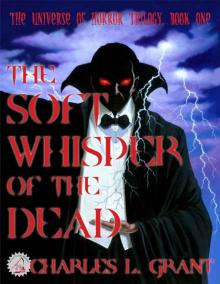 The Universe of Horror Volume 1: The Soft Whisper of the Dead (Neccon Classic Horror)
The Universe of Horror Volume 1: The Soft Whisper of the Dead (Neccon Classic Horror)![[Oxrun Station] Dialing The Wind Read online](http://i1.bookreadfree.com/i/03/19/oxrun_station_dialing_the_wind_preview.jpg) [Oxrun Station] Dialing The Wind
[Oxrun Station] Dialing The Wind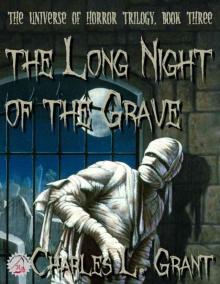 The Universe of Horror Volume 3: The Long Night of the Grave (Neccon Classic Horror)
The Universe of Horror Volume 3: The Long Night of the Grave (Neccon Classic Horror)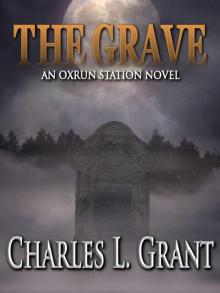 The Grave - An Oxrun Station Novel (Oxrun Station Novels)
The Grave - An Oxrun Station Novel (Oxrun Station Novels)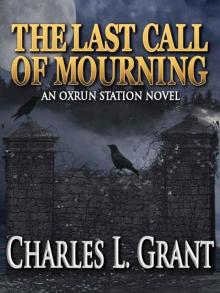 The Last Call of Mourning - An Oxrun Station Novel (Oxrun Station Novels)
The Last Call of Mourning - An Oxrun Station Novel (Oxrun Station Novels)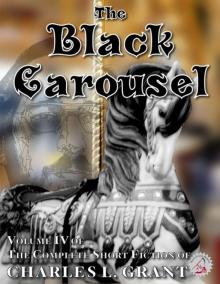 The Complete Short Fiction of Charles L. Grant, Volume IV: The Black Carousel
The Complete Short Fiction of Charles L. Grant, Volume IV: The Black Carousel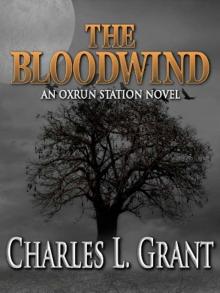 The Bloodwind - An Oxrun Station Novel (Oxrun Station Novels)
The Bloodwind - An Oxrun Station Novel (Oxrun Station Novels)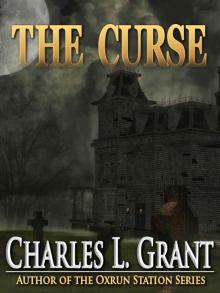 The Curse
The Curse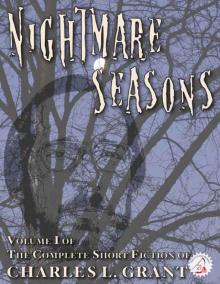 The Complete Short Fiction of Charles L. Grant Volume 1: Nightmare Seasons (Necon Classic Horror)
The Complete Short Fiction of Charles L. Grant Volume 1: Nightmare Seasons (Necon Classic Horror)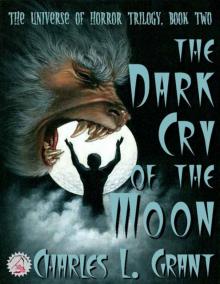 The Universe of Horror Volume 2: The Dark Cry of the Moon (Neccon Classic Horror)
The Universe of Horror Volume 2: The Dark Cry of the Moon (Neccon Classic Horror)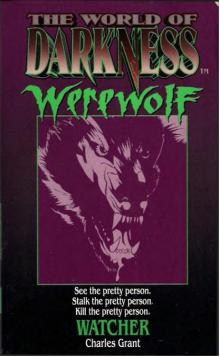 Watcher: Based on the Apocalypse (World of Darkness : Werewolf)
Watcher: Based on the Apocalypse (World of Darkness : Werewolf)![[Oxrun Station] The Bloodwind Read online](http://i1.bookreadfree.com/i/03/25/oxrun_station_the_bloodwind_preview.jpg) [Oxrun Station] The Bloodwind
[Oxrun Station] The Bloodwind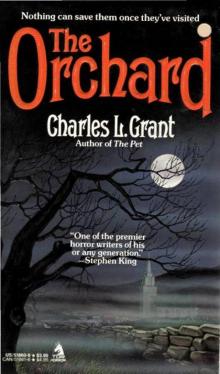 The Orchard
The Orchard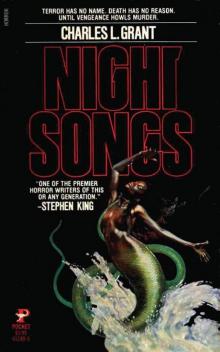 Night Songs
Night Songs Shadows 3
Shadows 3![Symphony - [Millennium Quartet 01] Read online](http://i1.bookreadfree.com/i1/04/02/symphony_-_millennium_quartet_01_preview.jpg) Symphony - [Millennium Quartet 01]
Symphony - [Millennium Quartet 01] The Hour of the Oxrun Dead (Necon Classic Horror)
The Hour of the Oxrun Dead (Necon Classic Horror)![In the Mood - [Millennium Quartet 02] Read online](http://i1.bookreadfree.com/i1/03/31/in_the_mood_-_millennium_quartet_02_preview.jpg) In the Mood - [Millennium Quartet 02]
In the Mood - [Millennium Quartet 02]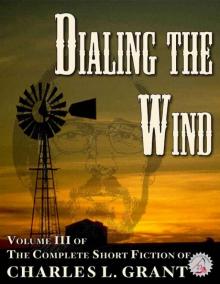 The Complete Short Fiction of Charles L. Grant Volume 3: Dialing the Wind (Neccon Classic Horror)
The Complete Short Fiction of Charles L. Grant Volume 3: Dialing the Wind (Neccon Classic Horror)![[Oxrun Station] The Last Call of Mourning Read online](http://i1.bookreadfree.com/i2/04/05/oxrun_station_the_last_call_of_mourning_preview.jpg) [Oxrun Station] The Last Call of Mourning
[Oxrun Station] The Last Call of Mourning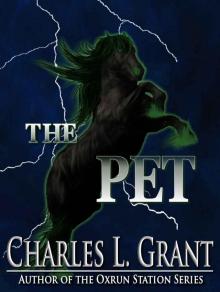 The Pet
The Pet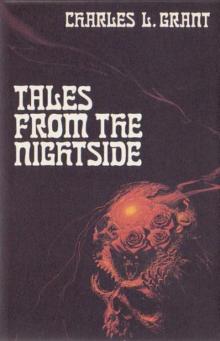 Tales from the Nightside
Tales from the Nightside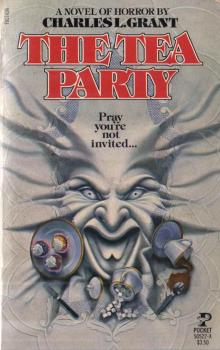 The Tea Party - A Novel of Horror
The Tea Party - A Novel of Horror The Complete Short Fiction of Charles L. Grant Volume 2: The Orchard (Necon Classic Horror)
The Complete Short Fiction of Charles L. Grant Volume 2: The Orchard (Necon Classic Horror) Whirlwind
Whirlwind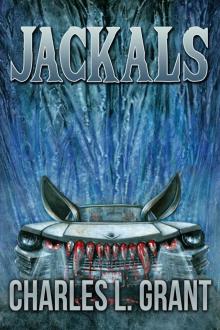 Jackals
Jackals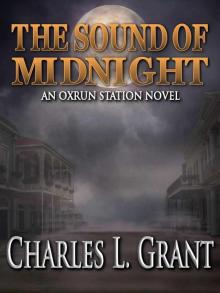 The Sound of Midnight - An Oxrun Station Novel
The Sound of Midnight - An Oxrun Station Novel